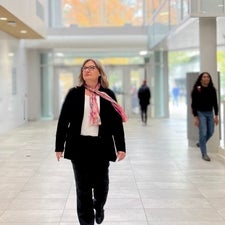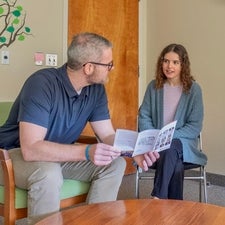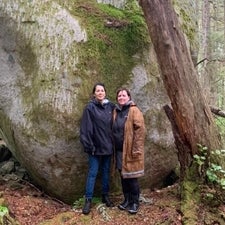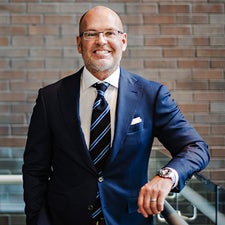The University of Waterloo’s annual publication Global Futures was recently released with a packed launch event at Fed Hall featuring Faculty of Arts professors Dr. Bessma Momani and Dr. Marcel O’Gorman as speakers, along with two remarkable graduate students from the faculties of Health and Engineering. Both Momani and O’Gorman outlined social, geopolitical, climate, and technological factors that are causing global instability and a range of inequalities — and how research can and is addressing them. (Watch the recording of Dr. Bessma Momani’s talk and recording of Dr. Marcel O’Gorman’s talk.)
Arts in Global Futures
The Global Futures publication itself features four stories from Arts.

Society needs diversity in STEM is an opinion piece by Dr. Carla Fehr, professor in Philosophy, advisor for the Gender and Social Justice program, and Wolfe Chair in Scientific and Technological Literacy. “My research shows that scientific communities who include members from diverse backgrounds, social and material locations, and those who hold different theoretical perspectives, facilitate research that is more creative and produces outcomes that better meet the needs of a wide range of publics,” writes Fehr.

Taking a family-centred approach to mental health care focuses on the work of Dr. Dillon Browne, professor in Psychology and Canada Research Chair in Child and Family Clinical Psychology. Recognizing a gap in Canada's predominantly individual-focused mental health landscape, Browne’s FamilyPsycle Lab integrates a family-centric perspective into mental health-care services. “We fit our treatments to the complexity of family life, rather than trying to fit families into our treatments,” says Browne.

Knowing our history to know ourselves is an opinion piece by Dr. Susan Roy, professor in History and at the Balsillie School of International Affairs. “As a non-Indigenous historian, I am honoured to partner with Indigenous communities on research projects that intersect legal, environmental, cultural and artistic contexts. This research approach prioritizes Indigenous initiatives, knowledges and ways of doing things. It ensures that research supports the critical cultural resurgences and land rights assertations within Indigenous communities,” writes Roy.

Illuminating human bias and our ability to be misled focuses on the research of Dr. Jonathan Fugelsang, professor in Psychology and alumnus Dr. Shane Littrell (PhD ’21). Their work establishes the concept of a “B.S. blind spot” (yes, that’s BS for bullshit) and highlights the implications of overconfidence in misinformation detection. “We need to teach misinformation awareness, healthy skepticism and encourage reflective thinking early on in life — as early as elementary school,” says Fugelsang.
A future for humanity
More than ever, Waterloo is committed to collaborative and interdisciplinarity approaches to tackling pressing challenges. Arts works alongside the faculties of Engineering, Environment, Health, Math, and Science in realizing the university’s Waterloo at 100 strategic vision. The Global Futures publication is based on priorities identified in that vision: societal, health, sustainable, technological, and economic futures.
“At the core of these five futures is a concern for the future of humanity,” said President Vivek Goel at the launch event. “The Global Futures, aligned to our academic and research strengths, will help us to focus and co-ordinate our work across disciplines and organizational boundaries.” Aligning with our institution as whole, A Future for Humanity is also at the core of the Arts 2023-2030 Strategic Plan.